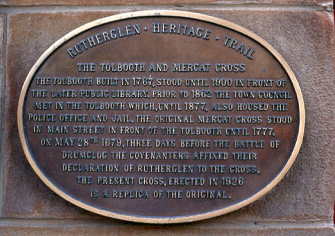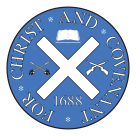
Rutherglen Market Cross
Main Street
Rutherglen
Lanarkshire
NGR - NS 614616
A local heritage plaque indicates the site of the former Market Cross (a replica now occupies the site) to which the Rutherglen Declaration was affixed.
The Rutherglen Declaration
On 29 May 1679 around seventy to eighty armed and mounted Covenanters rode into the burgh and read out a declaration, originally known as the Rutherglen Testimony) which condemned the acts which made conventicles and support for the Covenant illegal. It had been planned to affix it to the cross in Glasgow, but the presence of Claverhouse and his soldiers made them change their mind and Rutherglen was clsoen instead. The day was supposedly identified as one on which to celebrate the restoration of Charles II, but the Covenanters at Rutherglen extinguished the bonfires which had been lit to mark the event. A copy of the declaration was then affixed to the marked cross and the Covenanters rode off towards the moors for protection. They were led by Sir Robert Hamilton of Preston, 2nd Baronet, John ‘Burleigh’ Balfour, and James Russell. and local outed minister, Rev John Dickson. Rev Thomas Douglas led the crowd in prayer and Hamilton (1650-1701) read out the seven parts of the declaration which denounced episcopacy and the royal supremacy. The King’s statutes, including the Act of Supremacy, was taken from the market cross and burned in a fire lit by the Covenanters. Within a short period of time, the Covenanters were met at Drumclog, by the soldiers under John Graham of Claverhouse. The ensuing battle was won by the Covenanters.
Rev John Dickson (1628-1700) was later captured and spent from 1 September 1680 until 8 October 1686 imprisoned on the Bass Rock. He was allowed his freedom on grounds of ill-health, but had to report to the tolbooth in Edinburgh as required. He died on 12 January 1700, aged around 71.
The original market cross of Rutherglen no longer exists, having been removed in 1777. However, a replica was erected on the approximate site in 1926. A plaque, pictured, gives a little background history.
A full copy of the Rutherglen Declaration is shown below:
Rutherglen Declaration
‘As the Lord hath been pleased to keep and preserve his interest in this land, by the testimony of faithful witnesses from the beginning, so some in our days have not been wanting, who, upon great hazards, have added their testimony to the testimony of those who have gone before them, and who have suffered imprisonments, finings, forfeitures, banishment, torture, and death from an evil and perfidious adversary to the church and kingdom of our Lord Jesus Christ in the land.
Now we being pursued by the same adversary for our lives, while owning the interest of Christ, according to his word, and in the national and solemn league and covenants, judge it our duty (though unworthy, yet hoping we are true members of the church of Scotland) to add our testimony to those of the worthies who have gone before us, in witnessing against all things that have been done publicly in prejudice of his interest, from the beginning of the work of reformation, especially from the year 1648 downward to the year 1660. But more particularly those since, as
1. Against the act recissory, for overturning the whole covenanted reformation.
2. Against the acts for erecting and establishing of abjured prelacy.
3. Against that declaration imposed upon, and subscribed by all persons in public trust, where the covenants are renounced and condemned.
4. Against the act and declaration published at Glasgow, for outing of the faithful ministers who could not comply with prelacy, whereby 300 and upwards of them were illegally ejected.
5. Against that presumptuous act for imposing an holy anniversary day, as they call it, to be kept yearly upon the 29th of May, as a day of rejoicing and thanksgiving for the king’s birth and restoration; whereby the appointers have intruded upon the Lord’s prerogative, and the observers have given glory to the creature that is due to our Lord Redeemer, and rejoiced over the setting up an usurping power to the destroying the interest of Christ in the land.
6. Against the explicatory act, 1669, and sacrilegious supremacy enacted and established thereby.
7. Lastly. Against the acts of council, their warrants and instructions for indulgence, and all other their sinful and unlawful acts, made and executed by them, for promoting their usurped supremacy.
And, for confirmation of this our testimony, we do this day, being the 29th of May 1679, publicly at the cross of Rutherglen, most justly burn and above-mentioned acts, to evidence our dislike and testimony against the same, as they have unjustly, perfidiously, and presumptuously burned our sacred covenants. And, we hope, none will take exception against our not subscribing this our testimony, being so solemnly published; since we are always ready to do in this as shall be judged necessary, by consent of the rest of our suffering brethren in Scotland.’






